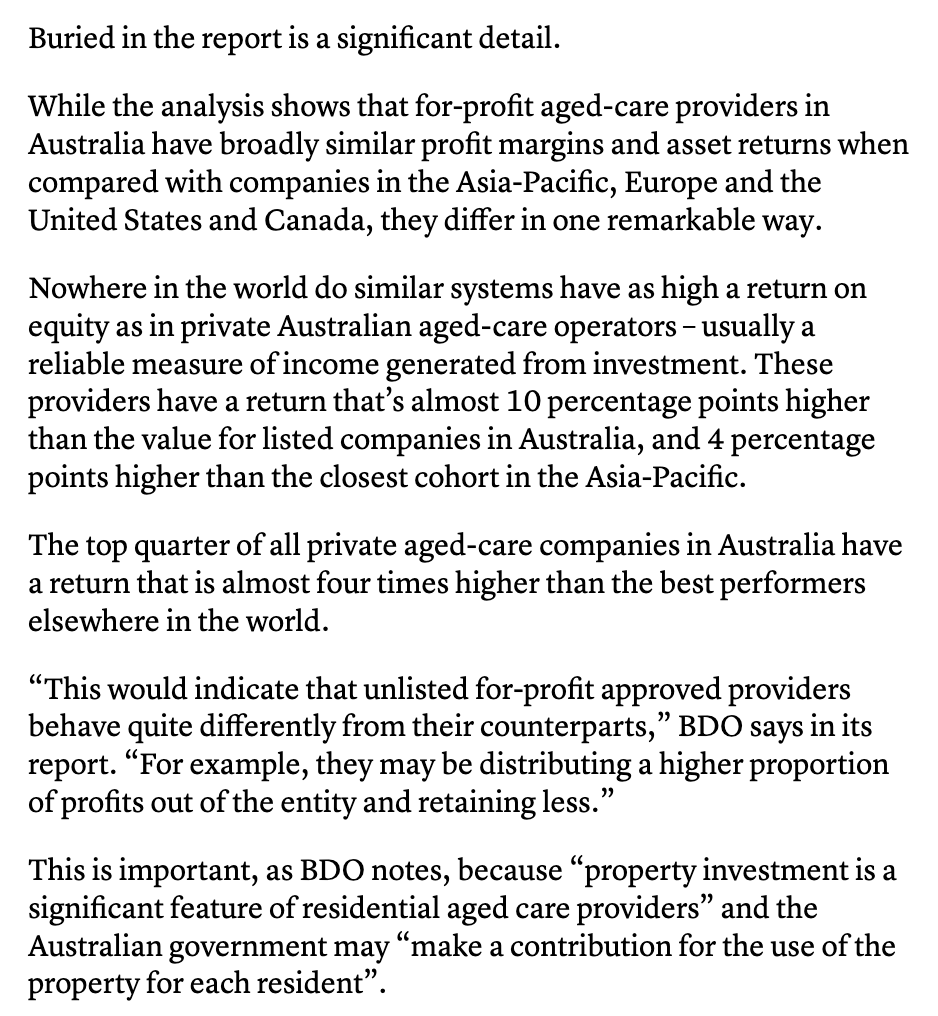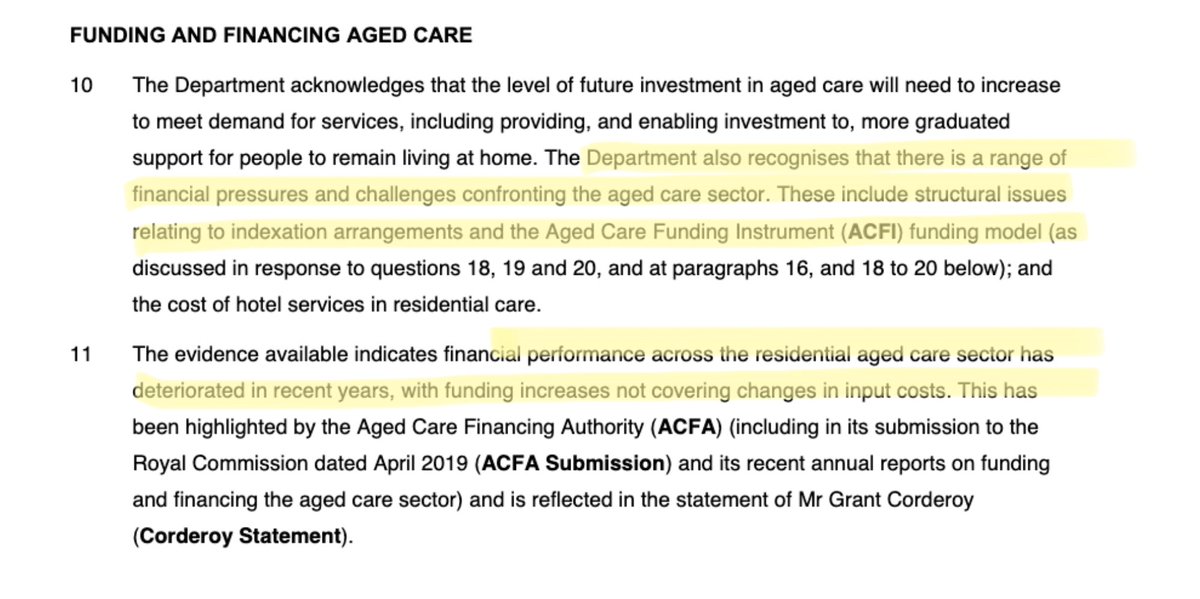The #agedcarerc hearings this week will be significant, I think. Staring this morning. On financing, funding and prudential regulation. I will try and update as we go, though live tweeting last time nearly killed me so I& #39;m making no promises!
If you want to get up to speed, many of these issues will be addressed at this #agedcareRC hearing. Notably, this telling detail from BDO Australia analysis commissioned by the inquiry. https://www.thesaturdaypaper.com.au/news/politics/2020/09/12/the-collapse-aged-care-part-one/159983280010409">https://www.thesaturdaypaper.com.au/news/poli...
Senior counsel assisting #agedcareRC Peter Rozen QC starts with some broad detail. For example, Home Care providers "are not required to report to the government what kinds of goods and services are provided with ($2.5bn in) home care package subsidies the Commonwealth supplies."
DoH surveyed to try and understand this. "The survey revealed that in 2018-19 there were negligible amounts spent on nursing and allied health care of 15 mins of each per fortnight, even for the most needy package holders." 15 minutes. #agedcarerc
And, as we know, in residential care: "the prudential reporting regime does not require providers to submit sufficient information about related party transactions on matters such as loans and interest, management fees and rent." We can& #39;t follow the money.
Rozen: "Further, there is no specific requirement on residential aged care providers to spend any particular portion of that money on care."
D& #39;oh I am a massive idiot. This isn& #39;t Rozen, this is Peter Gray QC. Sorry, my brain is stuck in the previous hearing.
PETER GRAY QC: "As the analysis in tab 114 shows expenditure on a per capita basis for people aged 70 and over has remained flat since the 1980s in real terms." Under the current funding model, ACFI, there is NO requirement to acquit this spending against individual care.
"In the report produced by BDO, it is
clear that despite the pressures that approved providers have faced, some are managing to extract sufficient profit margins to provide significant returns on their investments." This is fine if care is adequate, Gray says. But it& #39;s not.
clear that despite the pressures that approved providers have faced, some are managing to extract sufficient profit margins to provide significant returns on their investments." This is fine if care is adequate, Gray says. But it& #39;s not.
In my piece at the weekend, we showed that resi care providers hold $30bn in accommodation bonds that are ~guaranteed~ by the commonwealth. Now, there are growing concerns about this system.
On bonds: "Over recent years, BDO’s analysis indicates that liquidity has decreased amongst a significant number of providers, to the point where there may be grounds for concern about the recoverability of a large amount of these deposits." Especially with Covid-19 deaths.
On need, this is key.
"The surprising truth is that no-one can say whether the current levels of funding available to providers for various forms of care correctly calibrated to the costs of providing high quality care." No one can say. Govt should know but they don& #39;t.
"The surprising truth is that no-one can say whether the current levels of funding available to providers for various forms of care correctly calibrated to the costs of providing high quality care." No one can say. Govt should know but they don& #39;t.
"Compounding this problem is the fact that the way in which funding levels have been indexed for inflation since the 1990s has meant that funding has not increased in line with real cost increases in service delivery inputs." Dept of Health concedes this. #agedcarerc
Now, to the facts Scott Morrison has been denying since 2018! The following is precisely what was cut in the aged care budget, now being called out by the Royal Commission. For the avoidance of all doubt.
"In addition... indexation of residential care subsidies calculated through the Aged Care funding Instrument (ACFI) has been frozen on two occasions in recent years. There have been other interventions to reduce ACFI such as 2016 amendments of high care classification criteria."
But remember, both Morrison and ABC Fact Check incorrectly said aged care funding wasn& #39;t cut. What a debacle.
So, moving on, why are some providers doing well and others are on the verge of collapse? Staffing is one.
"One feature of the current system is that providers are left to their own devices to determine appropriate staffing levels and skills mixes under a vaguely expressed statutory expression that they maintain appropriate staff," Gray QC says.
"As we have previously submitted, there should be mandatory (albeit somewhat flexible) staff contact time, and there should be acquittal of staffing costs. This will result in higher funding accompanied by public accountability for expenditure on care," Gray says. Huge.
I won& #39;t go into the foreshadowing of all the propositions Gray QC will put later in this hearing as I am about to jump on my weekly editorial teleconference with the bosses. But will pick out any interesting bits from here.
Fuck, here& #39;s an interesting one. Regarding those massive accommodation bond deposits, analysts recommend liquidity ratios of 15% in order to meet obligations. This was a key measure in previous 11 cases of providers triggering govt guarantee of bonds because they could not pay.
"In 2018 financial year, 193 of 777 approved providers had liquidity levels of less than 15% and of those 60 providers had liquidity levels of less than 1%. Stewart Brown found value of the bonds of the providers with a liquidity ratio of less than 1% was $4.3 billion."
Gray: "The Commonwealth government took over full administrative and funding responsibility for aged care in 2012, but has not yet assumed a proactive system governance role. It should do so now, either directly or by appointing a dedicated independent body to do so."
To go back to accommodation bonds, found this briefing to the Department of Health in the tendered aged care exhibits. To understand it, you need to know: Bonds can be paid as a lump sum, a daily fee (based on bond value x interest) or as a combination of both.
Providers keep the interest from these bonds where they are paid as a lump sum. It& #39;s free money! BUT they do have to pay back the original amount when a person leaves their care. Usually, fine, because new entrant bonds would cover the value. However, we are now seeing new trend.
New entrants are choosing daily fees over lump sum bonds. So providers are having to front up for the repaid bonds and they& #39;re not getting them back. This advice to govt estimates $1bn has been lost since February alone. That is enormous. This is a viability issue.
Put another way, the aged care system as it currently stands bears a striking similarity to a pyramid scheme.
Now this is interesting. Re: the cuts to direct care subsidy (the ACFI) which the govt refuses to acknowledge. Now, Department of Health tells the #agedcareRC that indexation hasn& #39;t kept pace with costs (data has been showing that for yonks)

 Read on Twitter
Read on Twitter





